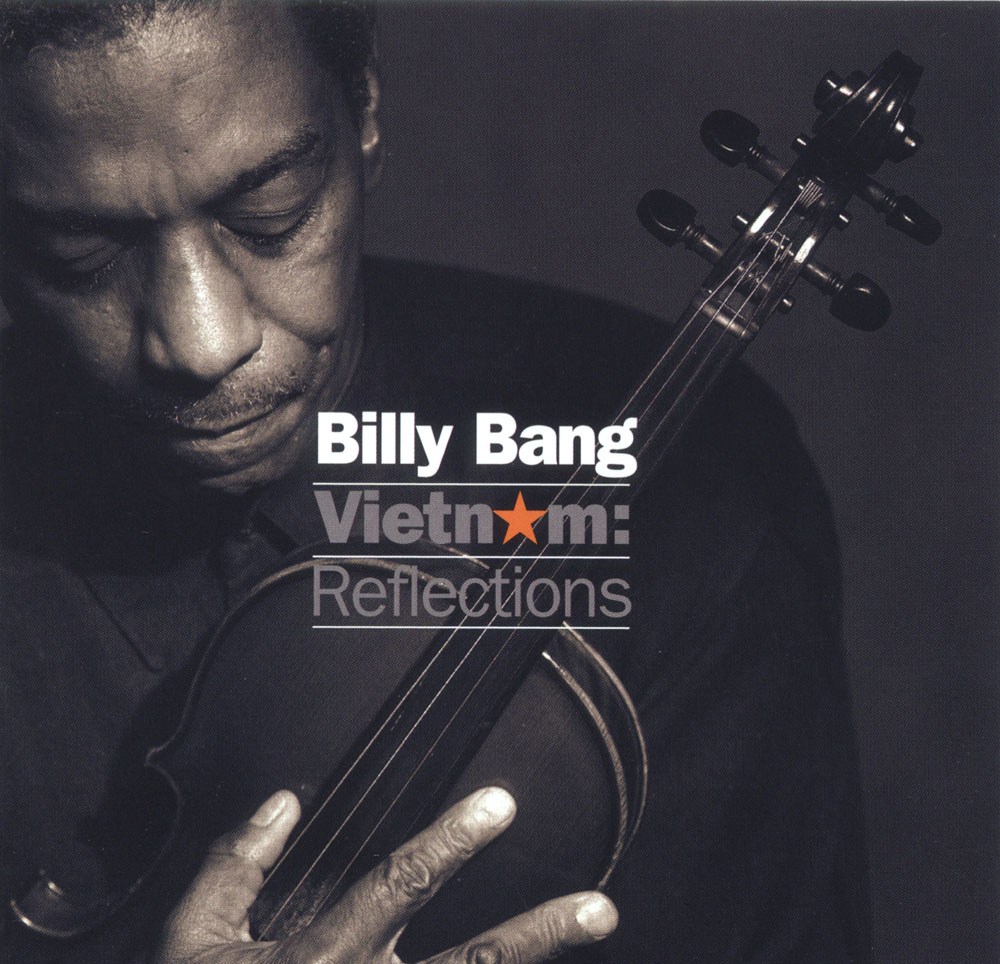 Download PDF of this full issue: v35n2.pdf (18.1 MB)
Download PDF of this full issue: v35n2.pdf (18.1 MB)From Vietnam Veterans Against the War, http://www.vvaw.org/veteran/article/?id=574&hilite=
 Download PDF of this full issue: v35n2.pdf (18.1 MB) Download PDF of this full issue: v35n2.pdf (18.1 MB) |
Vietnam: Reflections
Billy Bang
(Justin Time, 2005)
I must start out by saying that I am not a musician, so don't expect this review to be a note-by-note musical analysis of this disc. However, my background does include nearly thirty years of recording jazz and producing shows, and I have a lifelong love of the music and the musicians. This CD is definitely one in the "love" column.
Vietnam: Reflections is Billy Bang's second release with fellow Vietnam veteran sidemen and their Vietnam experiences as a base for the musical ideas expressed. It is of a very different mood than the first CD in this series; Vietnam: The Aftermath, reviewed a few years ago in these pages by Lisa Boucher (herself a fine fiddler).

|
While Aftermath is a look back at the hell that was the Vietnam experience and the pain and passion of that war through the experiences of Mr. Bang (AKA Sgt. William Walker), this new recording is a different thing entirely.
The differences start with the cover art. Aftermath has Bang with an M-60 across his shoulders, looking young and tough with dog tags hanging around his neck, taken in-country. Vietnam: Reflections shows him caressing his violin in a more introspectively peaceful mood. On the back there is a picture of a peace sign hanging in a jungle scene. The music mirrors this; it too is much more introspective. Making the Aftermath CD helped Billy Bang to let go of some of the demons that had a hold of him since those days, whereas Reflections sounds much more at peace with the past. The healing process that these two releases provided is evident here. This is not to say that there is no edge to this music—anyone familiar with Bang's recordings knows he always has a truly amazing edge to his playing and writing.
Bang's catharsis in getting past the past so he can exist in the present (and maybe even the future) has, to a certain extent, been accomplished; he has plans for an orchestral work to complete the process. This CD is more about the cultural experience of Vietnam and less of a military "looking back." This different perspective is expressed in his compositions and selection of musicians: some fellow veterans and some Vietnamese-born Americans.
"Ru Con" is violin, dan tranh (Vietnamese dulcimer), and vocals on a traditional Vietnamese lullaby in a straight reading of the tune. "Ly Ngua O," a traditional folk song about a wedding carriage drawn by a black horse, has vocals, drums, and dulcimer with Bang's violin floating over the top. "Doi Moi" starts with Bang and the rhythm section in a very sentimental mood in this mournful ballad, which is named after Vietnam's "open door" foreign policy of the 1980s. "Waltz of the Water Puppets" is named for an amazing art form originating in Vietnam. The song floats on a beautiful melody with wonderful solos by Henry Threadgill on flute followed by Bang and Hicks. "Trong Com" is Vietnamese for "rice drum" and is the last of the traditional folk songs featuring Bang on plucked violin, Nhan Thanh Ngo on dulcimer, Co Boi Nguyen on vocals, and (I believe) Ron Brown on percussion. The folk tunes work as a nice juxtaposition to Bang's original compositions. The participation of vocalist Co Boi Nguyen and Nhan Thanh Ngo on dan tranh show that there is more to reflect upon than just the war: the people and the culture in which they live.
The title tune, "Reflections," is a post-bop tune with an Asian flavor, especially at the violin's entrance and the coda, with great solos throughout. It sets the tone for this recording in its pure beauty and majesty; it can melt your heart to listen to the violinist's gut-wrenching sound and soulful melody. The tunes titled "Reconciliation 1" and "Reconciliation 2" are not simply alternate takes, but expressions of different emotions. "Reconciliation 1" starts with Butch Morris doing the conduction, which means he sets the form and picks who plays when, but it is up to the musicians to pick the notes they choose to play. Sounding very Asian with vocals, dulcimer, and drums, the building continues as the other instruments are added in a processional feeling. The instruments come and go in a very mysterious-sounding piece woven together by Butch Morris. "Reconciliation 2" starts out as a burning post-bop tune with a blues feel with just the rhythm section. Then Bang strides in with an Asian melody over the top, before settling back into the blues. There is no mystery in this reconciliation; it is fueled by strength and power, and the solos by Bang and Ted Daniel are much more self-assured that the reconciliation is being accomplished. We finally end up with one more taste of Asia at the coda, which is more dynamic and powerful, and more certain that the reconciliation is working.
My recommendation is to buy this CD, and buy many of Billy Bang's CDs. (Hell, also buy the other works of the veteran participants on this recording.) By all means, get out and hear them whenever you can. Support veteran musicians and artists in all forms, for their sacrifice is an ongoing event we should all understand.